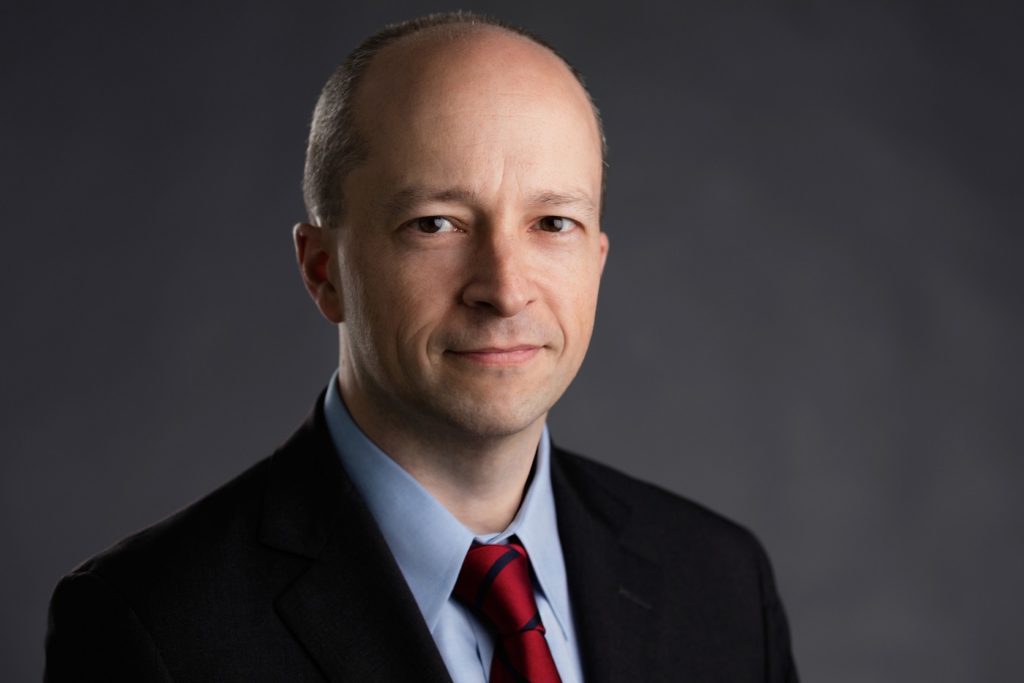In this month’s interview feature, Yuval Levin offers an update on some of the themes of his recent book, A Time to Build. He covers topics including the state of our institutions after the pandemic, the strengths and weaknesses of conservative populism, and what can be done about everything that’s wrong with social media.
Dr. Levin is director of Social, Cultural, and Constitutional Studies at the American Enterprise Institute, where he holds the Beth and Ravenel Curry Chair in Public Policy. He is also the founding editor-in-chief of National Affairs. He was interviewed on April 21, 2021 by Contributing Editor Daniel Burns, who has also written three previous responses to Levin’s book. The transcript has been lightly edited for clarity.
Daniel Burns: Here at Public Discourse, we’ve been running an ongoing series of pieces, inspired by your last book, about the state of our country and its various institutions. (We’ve got different articles looking at different institutions.) You’ve spoken recently about how what we’ve seen in the pandemic over the past year has confirmed one of the main theses of that book. Do you want to say a bit about that to start with?
Start your day with Public Discourse
Sign up and get our daily essays sent straight to your inbox.Yuval Levin: Yeah, well, thank you. First of all, I want to thank Public Discourse for doing that series, which has been humbling and gratifying, and has given the book too much credit! I think people have used it to make very important arguments of their own, and I’ve learned a huge amount from it.
I would say that the pandemic, broadly speaking, has shown us that America is what we have thought it was, but more so—for good and bad. Our weaknesses are exacerbated, but our strengths are demonstrated too. The book was largely about some of those weaknesses. And I do think that we’ve seen those show themselves all the more in a situation where people are pulled apart from each other, and then are made to function as though they are in an institution, but alone and apart.
To me, it’s shown a couple of things. I would say it’s clarified the difference between the different things we do when we’re together, in a way that I’ve found enlightening (though not always for the better). When we act together, when we interact with other people, there’s an element of communication and there’s an element of communion—that is, broadly speaking, of exchanging information and of being together. And, you know, the pandemic has forced us to separate these two out, and to not have any communion, but to have plenty of communication. And I think it’s really shown something that is essential to the argument of the book, which is that we underappreciate the importance of communion, in the things we do together. To be able to still communicate is just not nearly enough to actually sustain a lot of our institutions.
Some of that has presented itself in obvious ways. I’ve seen it in my synagogue community, where we can still see each other on Zoom (and we do), but, you know, remotely and apart from each other, you can’t do what such a community exists to do. I think we’ve seen in some ways in education. I think we’ve seen it in some of the ways that more of American life has been mediated by social media over this year.
Ultimately, communication is overrated, and communion is underrated. And we need more arenas for actual human interaction. That’s part of the argument of the book and, I think, part of what’s been failing about our institutions, and part of what we’ve seen this year.
The pandemic, broadly speaking, has shown us that America is what we have thought it was, but more so—for good and bad. Our weaknesses are exacerbated, but our strengths are demonstrated too. The book was largely about some of those weaknesses.
DB: Beyond emphasizing different things, is there anything that you would have written differently? Or that you would want to correct or modify based on what you’ve seen? Or has it mainly been confirmed?
YL: Well, I surely underestimated the potential for actual political violence in our society in writing the book. When I look at it now, there are all kinds of passages that say, “look, things are bad, but look at the early 1970s, when we had actual violence in the streets!” You know, if I’d written that after 2020, I would have seen actual violence in the streets (both left and right), in ways that I think sharpen the problem.
And I would say in general, one of the most interesting things for me in talking about the book with people is the challenge that I am too hopeful or optimistic. “Aren’t things worse than this?” And in a way, I try to write in general to draw that kind of response, because I need to hear myself say, “Actually, things are not as bad as you think they are.” I believe that’s true—but I also need to hear myself say it! And so I write in a way that forces me to say it over and over.
So surely there are ways in which the book would have been a little darker if it had been written after 2020, which was a dark year, and which showed our situation to be darker than it had seemed before. But I would also say that we have seen, over the course of this year, real action at the interpersonal and communal level to address problems—which should help us see that there are good things in our society too. We have seen some of the strengths of America, which we conservatives should not undersell, though we tend to. Our science and technology really are going to conquer this disease, which is no small thing. Even though I’m inclined to think we overestimate how much better they make us, that’s still significant.
DB: Your old friend Ross Douthat has occasionally in public compared your book with his most recent book, The Decadent Society, which offers a moderately bleak view of Western societies as caught in a stagnant decadence that he thinks is sustainable into the foreseeable future. He seems to think you have the more hopeful alternative to that.
YL: Yes.
DB: But reading your books, I would have thought the opposite. It seems to me that your take is the grimmer one, because you think that things could get better if we renew our institutions, but that they’re going to get worse if we don’t. I have the impression that you don’t think our current decadence is as sustainable as Douthat thinks it is. Is that a fair take? Or what do you see as the biggest difference between your two views?
YL: It is. I constantly say that to Ross.
I think in a way, our mix of hopefulness and gloom—our mixes are just different. Because I really do think that although there is more potential for renewal than Ross sees, there’s also more potential for decay and self-destruction. And, you know, he ends his book (which is a fantastically important and brilliant book) with some scenarios that could get us out of the decadence he describes. And those scenarios are almost structural; they’re just things that might happen. Whereas I tend to think in terms of what we need to do. And what we need to do, which I think is doable, is nonetheless extremely difficult. It would require us to resist so many of the incentives that we now confront in American life, that we should by no means imagine that it’s just going to happen.
So I always insist on this difference between hope and optimism, which I come to by way of Rabbi Jonathan Sacks, though I think it’s older and deeper than that. Hope is to believe in the possibility of positive change. Hope is a demanding virtue. It’s hard, it takes some courage, it takes energy, it takes a lot of action. To be optimistic is just to think that things are going to go well. And I think that’s silly. I’m a conservative, and I’m not an optimist. But I am hopeful. And I do think that the hard work that it would take for us to renew ourselves—and I don’t mean a social revolution that changes everything, but renewal, in pockets of virtue that our society can absolutely enable and sustain—I think that work is achievable. And the purpose of writing a book like this is not simply diagnostic. It’s not to say, here’s what’s happened, and here’s what might happen. It’s to say, here’s what should happen, and what you and I should do. In some ways, that makes me gloomier, I think, than Ross, and in some ways not. So it’s just a different mix.
Hope is a demanding virtue. It’s hard, it takes some courage, it takes energy, it takes a lot of action. To be optimistic is just to think that things are going to go well. And I think that’s silly. I’m a conservative, and I’m not an optimist. But I am hopeful.
DB: Is it fair to say that, if the things that you recognize need to get done don’t get done, your predictions for the short- to medium-term future are gloomier than Douthat’s?
YL: Yes. I think that is fair to say, yes.
DB: Okay. Another question about your book. It is, among other things, a warning against what you refer to there as the “populist demolition crews.” I sometimes have the impression, both in the book and in some of your follow-ups, that you’re trying to say to the populist Right, “Look, guys, I get everything you hate about our elites. I sympathize with all of it. There’s plenty to hate. But we’re stuck having elites. And so it’s not enough just to be trying to tear down corrupt elite institutions; you have to be building up new ones, or reforming the ones we have, because we need better elites.” Is that a fair take, first of all?
YL: Yeah. The last chapter of the book, which in a way is about meritocracy, makes that kind of case. I think, first of all, every society has an elite. That’s just unavoidable as a matter of the definition of the term. Some people are going to rise to the top and be in positions of power and authority; there’s going to be some common denominator that defines those people; and so you’re going to have an elite with some kind of organizing principle. The question is, what should that principle be? What can we do about it? And how do you get that elite to actually serve that society, rather than burn it for fuel?
And I think that these are now all questions that demand our attention, because we’re not doing well on this front. We have a huge elite problem in America. And I think that the populism of this moment is justified to the extent that it is dissatisfaction and frustration with our elites. What I argue in the book is that a core problem with today’s American elites is that, in a sense, the elite is defined by a barrier to entry—by a set of exams or institutions that are fundamentally selective. It’s not then defined by obligations about the use of power. It’s not defined by a sense of responsibility that says, the authority we have, and the privilege we have (to use a term that I think is actually a good term in our contemporary debate): these are ours by virtue of some commitment to use them for the improvement of the larger society, and especially of people in need. We don’t really impose those kinds of obligations on our elites now. And I think the logic of meritocracy has a lot to do with that. But a broader kind of deformation and decadence has to do with it, too.
I don’t think that the answer to that can be to have no elite. And more than that, I would say to my populist friends, not only that there’s no alternative to an elite (so we should argue about what it should be, rather than whether there should be one), but also that the effort they’re engaged in requires building as much as demolition. It requires political engagement, organization . . . and there’s not a lot of that in contemporary populism. I think we need a recovery of actual politics, rather than just of a kind of ethic of observation and commentary, which isn’t likely to get us anywhere.
DB: So what is the political payoff to your critique of conservative populism? Because it seems to me that the critique your book offers is not primarily a political critique. And I’m just wondering, if there’s a populist who wants to use governmental power to just make some elites squirm: do you really object to that, as long as it’s being done intelligently? Do you say, “Well, building up the better elite culture isn’t really the government’s job anyway, so the populists can do what they like in government, as long as there’s also some sort of positive work being done outside of government”? Or is there a real political divide that you see between yourself and conservative populism?
YL: Well, look, I think that there’s a difference between talking about what government should do and actually working to have government do something. There’s a lot that I agree with, with conservative populists, in terms of the need for a change of attitude on the right about the role and potential of government. I mean, that’s an argument that I’ve been part of making for a long time, and that I think is needed. But for that argument to actually be meaningful requires some engagement in actual politics.
Here’s one way to think about it. Right now—and I just wrote about this yesterday, so it’s on my mind, forgive me. But right now, there’s a strange dearth of factions within our political parties. You have these two parties, they’re divided from each other. They’re internally extremely cohesive, even though there are deep differences there. The differences exist on the left, and they exist on the right, but they’re not being represented by political action in a constructive way. So that for most of American history, there have been two big parties, but each of them had in it genuine factions: not just people of different opinions, but structures and organizations, modes of action—actual factions. This has always been true in our politics, and it’s actually how our politics really works. There’s a great book by Dan DiSalvo, the political scientist, called Engines of Change, that makes this argument about party factions being the moving force in American political life.
This would be a great time for party factions. There are really meaningful differences, substantive differences, within the Right today—to just take the Right (I think it’s true on the Left, too). If you look at today’s Republican senators, there are differences among them about the role of government that are very profound, and that are deeper than anything we’ve seen in two generations on the Right. But they take those differences as reasons to be publicly disappointed with each other, rather than as reasons to actually mobilize some bloc of voters (and politicians, and activists, and intellectuals) and try to negotiate about what the party should offer the country.
The really interesting secret to the power of factions is that they broaden party coalitions. They allow people to say, “I have a kind of Marco Rubio view about the role of government, and so I’m going to vote for a Republican.” Somebody else can say, “I have a Pat Toomey view about the role of government, and I’m going to vote for Republicans.” And it’s not wrong for them both to be voting for Republicans, even though they have different views, because the party is a negotiation between those two views, and ultimately, will serve both of them better than a vote for the other party. That’s how you build a more-than-50.001-percent majority. And both parties have lost the knack for doing this, and so neither of them can build that majority right now.
I think this would be a great moment to do that work, because the differences are actually substantive, and there could be real negotiation about them. You can see some examples of people trying. I think that the proposal from Mitt Romney and Tom Cotton, to combine E-Verify with an increase in the minimum wage, is just one of the most interesting things that’s happened in the politics of the Right in a long time. That’s what the Republican Party would look like if people were actually trying to make this moment into a politically meaningful one. But they don’t have factions behind them; they don’t have a coalition behind them. Everybody looked at that and thought, “Well, what the hell is this—that’s a weird mix of things—aren’t we supposed to be for one and against the other?”
And it seems to me that what it would take for today’s populism to really transform the party in a meaningful way, and ultimately to move politics, would be more of a sense of what it looks like to organize and be effective in politics. But even though people are now talking about using government more, I don’t think we’re actually any better at doing it. Because that would first require being serious about politics, which, at the moment, we aren’t really.
DB: One more question about politics. I’m going to read something that you wrote a day or two after the election. “Biden may give the activists some power over administrative actions. But the election suggests that these will be politically risky. . . . Maybe the Biden administration will pursue an aggressive liberal agenda of executive action. But we have now seen in both the Obama and the Trump years how ephemeral such action is by itself.” So that was your quick take right after the election.
YL: Yeah.
DB: Do you still stand by that? Should we not be too worried about the Biden administration’s executive agenda? And particularly, as you can imagine, I’m thinking of the effects it will have on the kind of religious institutions that you praise so highly in your book.
YL: Yeah. I mean, that argument was not that we shouldn’t worry about it, but that these are ephemeral, that these are not actually the ways in which policy changes in American politics. And I do think that’s basically right. I mean, I would say the administration has been giving the activists a lot of leeway over administrative action. And to build on the discussion of the Right we just had: I think on the Left, there is an activist core that’s very well defined. And then there’s an opposite side of the party that isn’t well defined at all, even though it basically holds the presidency, and is the reason that they have congressional majorities right now. So the activists can feel like, “We’re the Democratic Party, and we’re pushing ahead!” and they can be really mad at Joe Manchin—when in fact what the Democrats really need, to make the kind of change they’re looking for, are about eight or nine more Joe Manchins. They don’t see that, and they don’t want to see that.
And I think they are achieving much less than they think right now. People have persuaded themselves that the COVID relief bill they passed was this transformative thing. They’re persuading themselves that they’re about to do this huge transformative thing with infrastructure. I’m not so sure. I mean, look, that bill was the sixth in a series of COVID relief bills, it was the second largest of them, and most of what it did was pour money down the same path. Let’s see, of course, what happens with infrastructure.
The executive actions are obviously much more aggressive and dramatic. You know, they’re going to confront a more conservative judiciary than the Obama administration did, and . . . we’ll see what happens there. And they’re executive actions, and so they last as long as the Biden administration. That doesn’t mean they’re unimportant, or that we shouldn’t worry about them, or that they won’t create huge problems for the institutions that I care about. But I think that they aren’t what the activists think they are.
People have persuaded themselves that the COVID relief bill they passed was this transformative thing. They’re persuading themselves that they’re about to do this huge transformative thing with infrastructure. I’m not so sure.
DB: To pivot away from politics for a moment, your book includes some very hard-hitting passages about social media, and its effect on both our personal lives and our other institutions. Do you want to first just briefly summarize what it is that you don’t like about social media?
YL: Well, it’s hard to be brief, because there’s a lot I don’t like about social media.
The argument of the book is about the importance of institutions as the formative structures of our social lives and therefore of ourselves. Social media, when seen through that lens, and as it now presents itself, is just a profoundly destructive force. It disintermediates: it pulls people out of institutions that are fundamentally mediative institutions, puts people on platforms by themselves, and asks them to participate, basically passively, in acts of affirmation and peer pressure. It just puts on the table some vague, shallow notion and says to everybody, “Thumbs up or thumbs down.” That’s just an awful way to mediate our social existence as a society. And the more of that social life that we channel through social media, the worse we become.
And you know, beyond that, the concerns are obvious. It encourages all of our worst vices. It encourages bad behavior. It takes people out of structures of responsibility (like professional structures, and cultural and academic ones), and leaves them on a platform, in the wind, in a place where human beings just are not going to be capable of sustaining anything like a virtuous mode of life. And so I worry about it a lot.
There are obviously upsides, too. There are good things about social media. But I think that on net, you have to say the way we’ve used it, and what we’ve made of it, have been very bad for us.
DB: Okay, now I have three follow-ups about social media: one for individuals, one for groups, and then one for public policy. It seemed like in your book—you mentioned it a few times—you were particularly concerned about academics who aspire to be Twitter personalities.
YL: Yep.
DB: So I’ve talked to a number of younger academics or aspiring academics, and suppose that some of them aren’t as worried about this as you are. What kind of advice would you give to them—or more generally, to young people who like talking about ideas, and who see Twitter as a way to do that?
YL: Well, I’d say this. I think that one of the virtues of a genuine academic community is that gives you time to think before you speak; that it creates a set of circumstances where you can express yourself in the way in which you want to be understood. It’s not always good, because not everybody’s good at being clear. So when you have the time, you end up with academic writing, which is not ideal. But it does say what people mean to say. And the time, and the space, to actually think before you speak is enormously important.
Secondly, another virtue of academic communities is that they are capable of housing conversations that are not fully public conversations. You can think through ideas with colleagues, or in a classroom, and not simply be held accountable for every thought you have in the process.
I think that substituting social media for the academic community undermines both of these. It encourages you to speak before you think. And it also makes everything fully public in a way that makes it very, very hard to think through ideas with other people. And so if you don’t have time to think on your own, and you don’t have a venue to think with other people, then . . . there’s not a whole lot that’s good about being an academic! I just think that social media doesn’t mix well with academic life.
DB: Second question about social media. Every college student I’ve talked to, even if they’re on social media all the time, seems to recognize that there’s something kind of awful about it. But there’s a sort of collective action problem. So do you see any possible way forward, maybe along lines somehow similar to the Temperance movement, where you have voluntary associations or individual institutions creating the space for a kind of collective resistance to the influence of tech or social media on our lives?
YL: Yeah, I think this would be very hard to do, but I’ve had some conversations with friends in various universities, where they’re parts of honors programs (or whatever it is, little schools within the university), and I’ve tried to suggest to them that one of the rules for students who want to be in these programs is they should be off social media, during the academic year—entirely. It would cut into the number of students who want to be in these programs, I think (although maybe it wouldn’t). But it would also clarify some of what it means to be committed to the kind of academic discipline that these programs want to encourage. I think there may be ways to create sort of intentional communities of people who just don’t have a social media presence. And who do that for a reason: they say something by staying off of it.
There’s something to be learned from Temperance about that. Obviously the cultural circumstances are very different. But I think making a statement together—by refraining from something that has enormous appeal but is bad for us—requires a strong community, but can also make a strong community. So it’s worth trying.
DB: Last question about social media: public policy. Everyone’s talking about other issues related to Big Tech right now: privacy, censorship, monopolies, all the other stuff. But is there anything that you see that public policy can do to push back on the specific dangers of tech that your book seems to be most focused on—the damage to human relationships, that is?
YL: I’m pretty skeptical that there’s a public policy solution, per se, to that. I am very open to acting on some of the other concerns about tech, which I generally share. The power that the tech companies have, which is a new kind of power in our politics, just has to be thought through. And I think ultimately, the answer to the question “What should public policy have to say about this?” is not going to be “nothing.” But what can it really do about the cultural effect? I don’t know that I can see an answer to that. And it’s not just because of constitutional constraints, or some idea about the role of government. I just actually don’t think I see a public-policy way forward that wouldn’t be worse than the disease.
This really just requires us to be better people. And there’s always a tendency to say, well, what’s the policy agenda that could do that? But I think the answer to that isn’t generally very helpful.
DB: Final question, unrelated. You’re known as somebody who likes old books. Pick one older book—say, written at least before your lifetime—that we should all be either reading or rereading in our present moment.
YL: You know, this is this is going to be a predictable answer. Although maybe there are a few that would be predictable. But I think that all of Robert Nisbet, and especially The Quest for Community, is just for this time. There are many greater books than that, and we can talk about classics, and we can talk about Tocqueville and Burke, and everybody should read those. But I think a less obvious answer is, this is a moment for Nisbet. And we really all should be trying to learn from him—in part especially because he wrote during what now would strike us as a kind of golden age for all the problems I’m talking about. He wrote The Quest for Community in the early 1950s. That should really be on our mind as we read that book, and should force us to think about what we actually mean when we think through what we’re looking to do, and what we want to achieve, and what our problems are. It’s just a tremendously important book.












